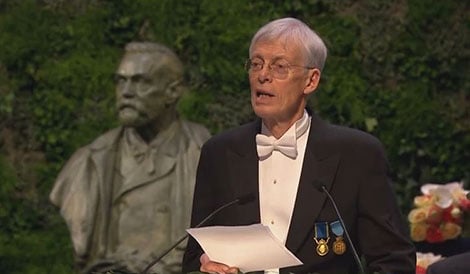Award ceremony speech
English
Presentation Speech by Writer, PhD Jesper Svenbro, Member of the Swedish Academy, 10 December 2014.

Writer Jesper Svenbro delivering the Presentation Speech for the 2014 Nobel Prize in Literature at the Stockholm Concert Hall.
Your Majesties, Your Royal Highnesses, Esteemed Laureates, Ladies and Gentlemen,
Barely a decade into Patrick Modiano’s oeuvre we come across the following important paragraph:
“I was only twenty, but my memory preceded my birth. For example, I was sure of having lived in occupied Paris since I remembered certain characters of that epoch and small unsettling details such as are never mentioned in history books. However, I tried to resist the weight pulling me backwards and dreamed of being freed of my poisoned memory. I would have given anything to be stricken with amnesia.”
Here Modiano had abandoned the staccato rhythm characteristic of his first three novels and discovered in Villa Triste (1975) the meditative legato we now associate with his novels. But the road to it, which was also the road to his masterpiece Dora Bruder (1997), could not be taken for granted.
If we take Modiano at his word, he was twenty when he discovered the horrifying sphere of experience that had befallen him: occupied France with its collaborators and shady small-timers, incarnated by an elusive yet cherished father figure. Readers who from the mature novels come upon his debut will inevitably be taken aback when the door is flung open to the noisy room of the main character’s consciousness, in which the contradictory reality of the Occupation years is presented as a cruel farce with the protagonist, Raphaël Schlemilovitch, in the role of “the sixth of the Marx brothers”.
Clearly, it was not easy in the mid-1960s to come to terms with the reality of the Occupation. Still, Modiano courageously and independently took up this challenge in his first three novels and – together with director and co-scriptwriter Louis Malle – in the controversial film Lacombe Lucien (1974). His exploration of the history of the Occupation, still synonymous around 1970 with the legends of the Resistance, was independent not least in that it was completely inopportune.
In other words: the revaluation of the Vichy period undertaken by the American historian Robert Paxton around 1970 and now largely accepted was anticipated by the young Modiano, who with his extraordinary, intuitive understanding of the life-world of the Occupation might even be said to have fulfilled a mission.
1975 saw the publication of Villa Triste, no doubt a turning point in Modiano’s development towards the calm prose associated with his name today. The title seems at first to refer to an elegant yet melancholy resort in the French Alps but this impression is deceptive: though not a word suggests it, villa triste is the Italian term for the buildings where the Fascists tortured opponents during the last years of WWII. Seen against this background, the break between the first three novels and Villa Triste becomes less important. The title discreetly points both to a harrowing past and to a seemingly innocent amnesia, cancelled twenty years later in Dora Bruder.
In novel upon novel Modiano has developed his ability to use almost non-existent documentation – old telephone numbers, street addresses – to endow the past with entrancing life and his Parisian cityscape with a singular voice. Magnificently, his work instantiates what an earlier Nobel Laureate, Seamus Heaney, called “the poetry of place”.
Dear Patrick Modiano, Alfred Nobel’s testament stipulates that the Nobel Prize for Literature be awarded to the author of the most outstanding work produced “during the preceding year”. In many earlier cases, the time aspect had to be disregarded but this year it is highly relevant.
In 2013 a 1,000-page volume entitled Romans was published, comprising ten of your previous novels. Though in one sense a reprint, this is also a new totality not reducible to the sum of its components.
For this collection allows us to understand how your “little music” is part of the grand one, with its variations, echoes, and repetitions, as autobiography merges with fiction, inviting us to reread your entire oeuvre, including those novels not selected for the omnibus edition but forming part of the same vertiginous project.
Dear Patrick Modiano, may I convey to you the warm congratulations of the Swedish Academy and invite you to receive the Nobel Prize for Literature from the hands of His Majesty the King.
Nobel Prizes and laureates
Six prizes were awarded for achievements that have conferred the greatest benefit to humankind. The 12 laureates' work and discoveries range from proteins' structures and machine learning to fighting for a world free of nuclear weapons.
See them all presented here.
